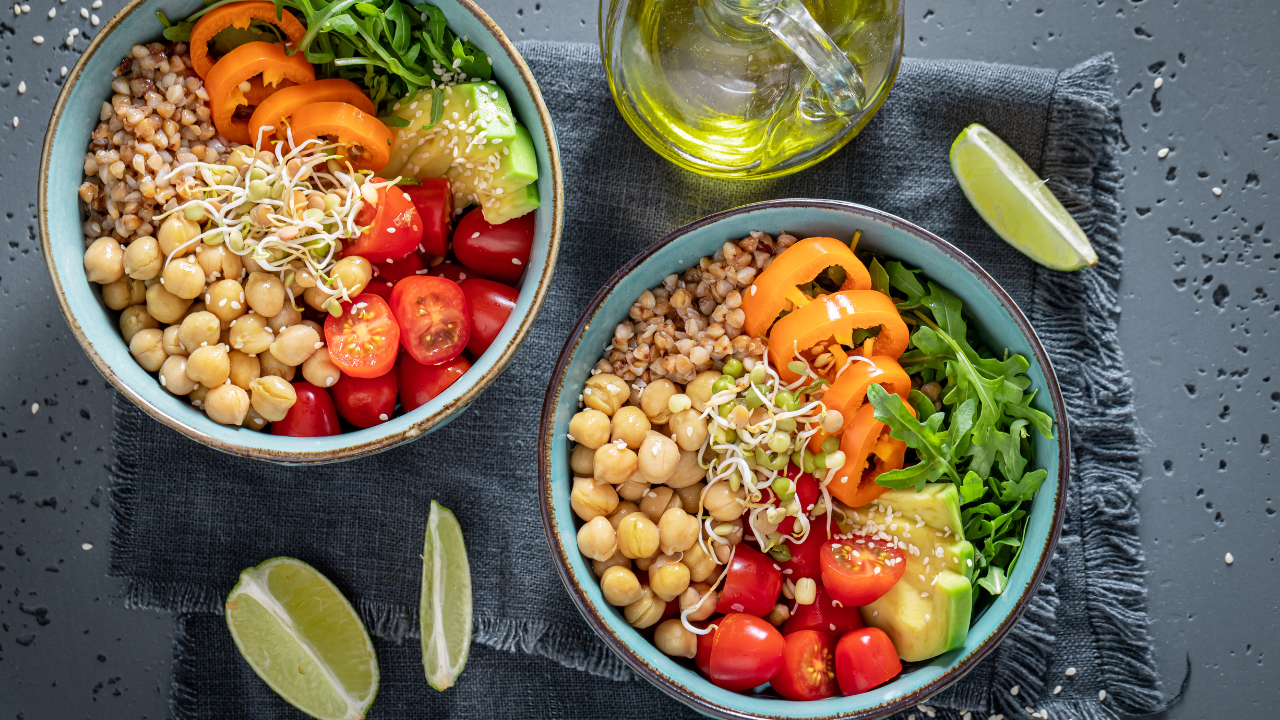The Ultimate Guide to Artificial Sweeteners
Artificial sweeteners have long been a topic of debate. Are they safe? Will they impact blood sugar? Do they have side effects?
As a registered dietitian and content creator, I get asked about artificial sweeteners on a daily basis. This blog is intended to be your all-inclusive guide to sugar substitutes, should you choose to partake.
If you’re new here, hello and welcome! My name is Hannah and I am a non-diet dietitian here to help you improve your relationship with your food and finally find food freedom.
Table of contents
What are artificial sweeteners?
Artificial sweeteners (also referred to as sugar substitutes or non-nutritive sweeteners) are ingredients used to add sweetness to foods. Artificial sweeteners tend to be much sweeter than table sugar, so smaller amounts are typically needed to achieve the desired sweetness level.
Artificial sweeteners contribute very few or no calories to the diet. They are commonly found in sugar-free products such as diet sodas, nutrition bars, chewing gum, and desserts such as sugar-free puddings and light ice creams.
Are artificial sweeteners healthier than sugar?
As I always say, what is “healthy” for one person may not be the “healthiest” choice for someone else. It very much depends on the context as the individual.
There may be valid reasons to choose artificial sweeteners as well as calorie-containing sweeteners. Personally, I use a variety of sweeteners in my day-to-day life. For me, they have different applications. I like to use granulated sugar for baking, maple syrup on top of pancakes, honey in my tea, and a diet soda for a fun afternoon beverage.
As a non-diet dietitian, I encourage people to ask themselves what the “why” is behind their food choices. For example, why are you choosing Diet Coke? Are you choosing Diet Coke over regular Coke because you would feel guilty for drinking your calories? Would you feel anxious if a regular soda was the only option available? Would you restrict after having a regular soda or feel like you had to “burn it off”? Taking a look at your motivation for making certain food and beverage choices can give you an insight into your relationship with food, which is ultimately an important factor in your overall health.
I know it can feel frustrating when a health professional says “it depends” instead of just defining a food as “healthy” or “unhealthy”. But nutrition truly does not work like that. The healthfulness of a food or ingredient really does depend on so many factors.
Natural vs. refined sweeteners
What about all the other sweeteners out there? Some people claim that sugar from fruit, honey, agave, and other “natural” sugars are healthier than “refined” sugar. Is this true?
First of all, the term “natural” doesn’t have any real meaning. This is not a regulated term, meaning that anyone can slap the word “natural” on virtually any food product. Although wellness culture has lead us believe that “natural” = “better”/”healthier”, this isn’t necessarily the case and the guideline of what counts as “natural” is an ever-moving goal post.
All carb (aka sugar) sources break down into glucose (besides fiber). When it comes to sugar, our body does not know the difference between granulated table sugar or honey. Now, there may be other nutrients in the alternate sweeteners (such as small amounts of antioxidants in honey, for example). But in terms of the sugar, it all turns into glucose. Choose what you like or whichever one makes the most sense for the application.
I also always try to bring up price and accessibility when discussing the “healthiness” of certain foods. Many of the “natural” sweeteners or foods made with the “natural” alternatives tend to be more expensive. For example, a bag of coconut sugar is going to have a much higher price tag than granulated sugar. But as I mentioned, the body is going to break them both down into glucose. So even though wellness culture will tell us that coconut sugar is the “better” option, this isn’t the case. In fact, it only brings shame to those who can’t afford the expensive alternatives and they may feel guilty for “not doing more for their health”.
Read more: Understanding Your Carb Cravings
Are artificial sweeteners safe?
The short answer is yes, artificial sweeteners are safe. Artificial sweeteners such as aspartame have many studies to back up their safety.
Some people dislike the taste or find that they experience side effects, such as gastrointestinal upset or headaches. If that is the case, you of course may choose to limit your intake of these foods. However, demonizing artificial sweeteners and foods that contain them is unnecessary and also not evidence-based.
The US Food and Drug Administration (FDA) has published a chart that illustrates the safe limit for each sweetener based on their acceptable daily intakes (ADI). The ADI estimates the amount of a substance considered safe to consume each day over the course of a person’s lifetime. As you can see in the chart below, large amounts of these sweeteners would need to be consumed day in and day out to achieve an unsafe level of consumption.
source: FDA
Do artificial sweeteners cause weight gain?
Artificial sweeteners have historically been debated for their alleged role in weight gain. At the same time, sweetener advocates will state that artificially sweetened foods and beverages are a useful tool for those pursuing intentional weight loss. So, which is it?
Non-nutritive sweeteners provide very few to no calories. For this reason, they are sometimes recommended as an alternative for those looking to decrease their caloric intake. They also do not individually impact blood sugar levels like regular sugar does, so they are frequently recommended as an option for those looking to manage their blood sugars, such as those with diabetes.
Others hypothesize that people may compensate for “calorie-free” or low-calorie choices by eating or drinking more calories in other food choices or future meals. According to this claim, these additional calories may lead to weight gain or prevent weight loss. This instance may happen in some cases, but there is little evidence from scientific studies that people consistently and consciously overconsume calories as a result of consuming non-nutritive sweeteners.
The main point is that our body weight is the outcome of many factors beyond the food choice we make. Not to mention that intentional weight loss through dieting tends to do more harm to our health than good.
In the world of disordered eating and eating disorders, non-nutritive sweeteners tend to be abused because of their low calorie profile. As mentioned, it is generally safe to consume non-nutritive sweeteners, but issues may arise when the choice to consume them is rooted in disordered reasons.
Possible benefits of artificial sweeteners
Little to no impact on blood sugars
Artificial sweeteners do not impact blood glucose levels the way that carbohydrate-containing sweeteners (like table sugar and honey) do. For this reason, those who are looking to manage their blood sugars (such as those with diabetes or PCOS) may choose sugar substitutes where they can. That said, I do want to note that being mindful of blood sugars does not mean that all carbs and sugar need to be avoided!
Read more: Managing Your Diabetes with Intuitive Eating
Dental health
Artificial sweeteners may be less likely to contribute to tooth decay and cavities. What is most important, however, is overall good dental hygiene. Just like every other aspect of health, one particular food will not “make or break” anything.
Decreased added sugar intake
Around here, we do not demonize foods, including sugar. It is absolutely okay to enjoy sugar-containing foods.
If you are looking incorporate some gentle nutrition and decrease added sugar intake because it just doesn’t make you feel the best, occasionally choosing products with sugar substitutes may be a good fit for you. Again, it is all about the “why” behind our food choices!
Possible risks of artificial sweeteners
For the general population, consuming artificial sweeteners will not cause any side effects. That said, there are anecdotal reports of sugar substitute consumption causing symptoms, namely headaches.
If you do find that an artificial sweetener causes headaches or other symptoms, you have the power to choose foods without those sweeteners as an ingredient. This does not mean, however, that you have the right to tell others if they should or shouldn’t consume them. To each their own!
Note: people with difficulty metabolizing phenylalanine (an amino acid in aspartame) because of a rare genetic disorder called phenylketonuria (PKU) should avoid or restrict aspartame. Newborns are routinely tested for PKU before leaving the hospital. Consumers can identify whether a product has aspartame by looking for it by name in the ingredient list on the product label, which must include a statement to inform people with PKU that the product contains phenylalanine.
Types of artificial sweeteners
Based on available scientific evidence, there are a variety of non-nutritive sweeteners that are authorized by the FDA as food additives in the U.S.
Artificial sweeteners differ in terms of their chemical compositions and sweetness levels. Some people report taste differences amongst the sweeteners. If you choose to consume non-nutritive sweeteners, you can ultimately choose the ones that you prefer. Different pre-packaged foods will utilize different sweeteners and you can find the types listed in the ingredients on the food label.
Aspartame
The FDA first approved the use of aspartame as a sweetener in 1974 and it was approved as a general-purpose sweetener in 1996. There are over 100 studies demonstrating the safety of aspartame. In fact, aspartame is one of the most studied food additivies in the human food supply.
A few aspartame fast facts:
Aspartame is 200x sweeter than sugar.
Aspartame brand names include Nutrasweet®, Equal®, and Sugar Twin®.
The ADI for aspartame is 50 milligrams per kilogram of body weight (mg/kg) per day. In other words, a person weighing 150 pounds would need to consume 19 cans of diet soda every day over a lifetime to exceed this ADI.
Sucralose
Just like aspartame, the FDA regulates sucralose as a food additive. The FDA reviewed more than 110 studies designed to identify possible toxic effects.
Sucralose fast facts:
Sucralose is 600x sweeter than sugar.
Sucralose is sold under the brand name Splenda®.
Sucralose is heat stable, meaning it stays sweet even when used at high temperatures during baking, making it suitable as a sugar substitute in baked goods.
The ADI for sucralose is 5 milligrams per kilogram of body weight (mg/kg) per day.
Acesulfame potassium (Ace-K)
Ace-K is another food additive regulated by the FDA. It is typically combined with other sweeteners in food products that you’d find on the shelves.
Ace-K fast facts:
Ace-K is 200x sweeter than sugar.
Like sucralose ace-K is heat stable, meaning it stays sweet even when used at high temperatures during baking, making it suitable as a sugar substitute in baked goods.
It is included in the ingredient list on the food label as acesulfame K, acesulfame potassium, or Ace-K
The ADI for sucralose is 15 milligrams per kilogram of body weight (mg/kg) per day.
Saccharin
The FDA has regulated saccharin as a food additive since 1977. In the early 1970s, saccharin was linked with the development of bladder cancer in laboratory rats. Since then, more than 30 human studies demonstrated that the results found in rats were irrelevant to humans and that saccharin is safe for human consumption.
Saccharin fast facts:
Saccharin brand names include Sweet and Low®, Sweet Twin®, Sweet'N Low®, and Necta Sweet®.
Saccharin is 200 to 700x sweeter than sugar.
Saccharin contains no calories.
The ADI for saccharin is 15 milligrams per kilogram of body weight (mg/kg) per day.
Neotame
The FDA approved neotame for use as a general-purpose sweetener and flavor enhancer in foods in 2002.
Neotame fast facts:
Neotame is sold under the brand name Newtame®.
Neotame is 7,000 to 13,000x sweeter than sugar.
Neotame is also heat stable and stays sweet when used at high temperatures.
The ADI for neotame is 0.3 milligrams per kilogram of body weight (mg/kg) per day. This is a much lower ADI than the others, but the sweetness is much more potent.
Advantame
The FDA approved advantame for use as a general-purpose sweetener and flavor enhancer in foods in 2014.
Advantame fast facts:
Advantame is 20,000x sweeter than sugar.
Advantame is also heat stable and stays sweet when used at high temperatures.
The ADI for advantame is 32.8 milligrams per kilogram of body weight (mg/kg) per day
Stevia
Stevia, aka Steviol glycosides, are natural constituents of the leaves of a plant native to parts of South America. Stevia is technically not an artificial sweetener, but a plant-based sweetener that is non-nutritive (meaning that it does not provide calories).
Certain high-purity stevia glycoside extracts have been generally recognized as safe (GRAS) and may be added to food products. The use of stevia leaf and crude stevia extracts is not considered GRAS, and their import into the U.S. is not permitted for use as sweeteners.
Stevia is 200-400x sweeter than sugar and the ADI of stevia is dependent on the type of stevia, but it is similar to other sweeteners.
Monk fruit
Like stevia, monk fruit is also not technically an artificial sweetener, but a fruit-based sweetener that contains zero calories per serving. Siraitia grosvenorii Swingle, commonly known as Luo Han Guo or monk fruit, is a plant native to Southern China. These fruit extracts are intended for use as general-purpose sweeteners and as tabletop sweeteners.
Depending on the origin of the monk fruit sweetener, it is reported to be 100 to 250x sweeter than sugar.
Sugar alcohols
The FDA also permits the use of sugar alcohols, another class of sweeteners, as sugar substitutes. Examples include sorbitol, xylitol, lactitol, mannitol, erythritol, and maltitol. The sweetness of sugar alcohols varies from 25% to 100% as sweet as sugar.
Sugar alcohols may cause gastrointestinal issues, such as gas, bloating, and diarrhea, especially when consumed in large amounts. They are otherwise safe and have no impact on blood sugars, but it is important to be mindful of intake to avoid their laxative effect. You can identify sugar alcohols on a food label by looking for the “-ol” ending on the sweeteners.
Bottom line
Artificial sweeteners are generally a safe food product to consume, despite what wellness culture claims. You always have the choice to consume them or not consume them based on your own taste preferences and how they make you feel.
Did you find this post helpful? Let me know your thoughts in the comments below!
Learn more
Featured podcast episode
Featured videos
Want more help on your diet ditching journey?
Join my signature membership to become part of a community of ex-dieters working towards food freedom and making peace with food so they no longer need to cut out their favorite foods.
More on the blog
Disclaimer: this post is for informational and educational purposes only and is not a substitute for professional medical advice.




































